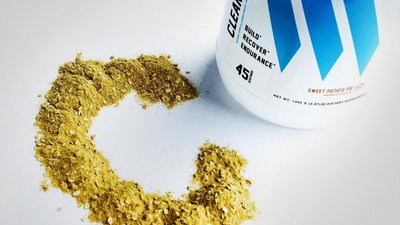Carbohydrates are the primary fuel source for your brain, body, and overall athletic performance, but not all carbs are created equal. Clean carbohydrate sources, aka complex carbohydrates, provide the long-lasting, sustained energy you need for prolonged workouts, such as running, cycling, and high-intensity functional training. They also help you build more muscle and optimize workout recovery. The question is, what carbohydrates are best for building mass, optimizing body composition, and improving performance?
The Problem with Simple Carbs
Chances are you've had a snack or chugged a sugary carb drink before a workout or run and found yourself gassed-out midway through your training. Simple carbohydrates and supplements such as maltodextrin, dextrose, and cyclic dextrin spike your insulin, which can lead to low blood sugar, leaving you feeling fatigued and lethargic.
Most people, athletes included, will have some kind of simple carbs an hour or two before their training session to get that midday pick-me-up. This stokes a vicious cycle that we call the blood sugar roller coaster.
After you finish your pre-workout snack, your body is flooded with carbohydrates, resulting in a short boost of energy, followed by a devastating crash and burn. Your body releases the hormone insulin to regulate the amount of sugar, or glucose, in your bloodstream. Insulin sends the sugar out of your blood into the liver and muscle and stores it as body fat, resulting in low blood sugar, which translates to low energy.
As a result, you have mood swings, feel hungry all the time, and/or become fatigued and have low energy. Maintaining steady insulin and blood sugar levels depends on the type of carbohydrates you consume. When you hear that certain carbs are "high on the glycemic index," it means that they will spike blood sugar and insulin more quickly than other types of carbohydrates.
You Need Complex Carbs
Complex carbs digest much more slowly than simple carbs, due to their longer-chain molecular structure. Complex carbs are also made of sugars, but they do not spike blood insulin; they keep your blood glucose stable and provide a sustained energy release. These types of carbohydrates work best for prolonged training, improving endurance, building more muscle, and optimizing body composition. Complex carbs slow the absorption of sugar, slowing digestion, which keeps you feeling fuller for longer. There's no blood sugar roller coaster with complex carbs.

What are the best clean carbs for building more muscle and performance?
1. Sweet Potatoes
Sweet potatoes have naturally occurring sugars and are full of dietary fiber and micronutrients. They are chock-full of vitamin B6, which can help maintain brain health, improving mood and energy levels. Sweet potatoes are also a great source of beta-carotene. Your body converts beta-carotene into vitamin A, which can help with immune health and eye health.
2. Yams
Nutritionally, yams resemble sweet potatoes. Both are low on the glycemic index, making them good choices for long-lasting, sustained energy without spiking blood sugar. Yams, however, have a higher vitamin C content than sweet potatoes but not nearly as much vitamin A.
3. Oats
Oats are an amazing source of complex carbohydrates and protein that can help build more muscle and optimize body composition. Oats are classified as a soluble fiber, which can help suppress appetite and slow digestion. Several studies have shown that oats can also protect against heart disease, reduce chronic inflammation, improve gut flora, help with inflammatory bowel disease, and provide sustained energy.[1-4]
4. Clean Carbs
Swolverine's Clean Carbs is different from other carbohydrate supplements. Other products use maltodextrin, dextrose, and simple carbohydrates that spike blood sugar, creating more body fat and giving you an energy crash.[5] Clean Carbs is made with 100 percent natural whole foods from pure complex carbohydrates, including sweet potatoes, yams, and oats. Research indicates that your body burns rapidly through glycogen stores during high-intensity functional training, resistance training, and endurance workouts. Replacing glycogen after strenuous exercise is vital for optimal performance and faster recovery.[5]

5. Brown Rice
Brown rice is another great clean carb for mass building and weight management. Whether you're shredding down or looking to increase size, brown rice is a great source of complex carbohydrates and will sustain a low insulin release for longer-lasting energy. Although similar, white rice is stripped of most of its nutrients and will trigger a blood sugar spike, as opposed to stable glucose levels.

6. Quinoa
Quinoa is one of the only plant-based carbs that is considered a complete protein. With all the essential amino acids present, in addition to micronutrients such as manganese, magnesium, and iron, quinoa is a great clean carb source for athletes.
References
- Chappell, A. J., Simper, T., & Barker, M. E. (2018). Nutritional strategies of high level natural bodybuilders during competition preparation. Journal of the International Society of Sports Nutrition, 15(1), 4.
- Rebello, C.J., Johnson, W.D., Martin, C.K., Xie, W., O’Shea, M., Kurilich, A., Bordenave, N., Andler, S., Klinken, B.J.W.V., Chu, Y.F. and Greenway, F.L. (2013). Acute effect of oatmeal on subjective measures of appetite and satiety compared to a ready-to-eat breakfast cereal: a randomized crossover trial. Journal of the American College of Nutrition, 32(4), 272-9.
- Valeur, J., Puaschitz, N. G., Midtvedt, T., & Berstad, A. (2016). Oatmeal porridge: impact on microflora-associated characteristics in healthy subjects. British Journal of Nutrition, 115(1), 62-67.
- Rasane, P., Jha, A., Sabikhi, L., Kumar, A., & Unnikrishnan, V. S. (2015). Nutritional advantages of oats and opportunities for its processing as value added foods-a review. Journal of Food Science and Technology, 52(2), 662-675.
- Alghannam, A. F., Gonzalez, J. T., & Betts, J. A., (2018). Restoration of muscle glycogen and functional capacity: role of post-exercise carbohydrate and protein co-ingestion. Nutrients, 10(2), 253.


